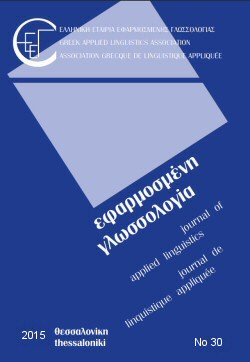Eleni Agathopoulou – Vasiliki Kasiakogia
PRACTICES AND VIEWS OF A LANGUAGE TEACHER AND A SUBJECT SPECIALIST IN TEACHING ENGLISH FOR ENGINEERS
Research in English for Specific Academic Purposes (ESAP) concerning differences between language teachers and subject specialists has been scarce and focused on the role of subject-specific knowledge in the interpretation and/or the pedagogical exploitation of academic texts. In the present study we compared a regular ESAP teacher with a chemical engineer, both of them teaching English for Engineers in Greek tertiary education institutes at the time. The rather rare occurrence of the latter type of informant made feasible the comparison between these two ESAP teachers with respect to course objectives, materials design, teaching methodology and their views on the role of the teacher and of subject-specific knowledge in ESAP. The findings demonstrated important discrepancies between the two informants, which can be attributed to their differences in discipline-specific knowledge and values. However there were also resemblances, mainly in teaching methodology, possibly stemming from the two informants’ similar previous learning experiences and their shared knowledge of educational and cultural traditions in the specific academic community.
Khaled Alhazmi – James Milton
PHONOLOGICAL VOCABULARY SIZE, ORTHOGRAPHIC VOCABULARY SIZE, AND EFL READING ABILITY AMONG NATIVE ARABIC SPEAKERS
Low vocabulary size and poor reading skills among native Arabic speakers learning EFL is a feature of the literature on second language acquisition (e.g., Alsaif 2011). Milton and Riordan (2006) suggest that the structure of the lexicon itself among these learners may be a contributory factor to their poor reading skills. They note that these learners often appear to recognise more English words by sound than by writing and speculate that learners may be tied to a phonological route to comprehension in reading. Phonological decoding of text will slow down reading speed and inhibit comprehension. This paper investigates this idea and tests 30 Arabic speaking learners using parallel vocabulary size tests in English which allow separate estimates of phonological and orthographic vocabulary size to be made. These results are then compared with sub-scores in the IELTS test. Generally, (e.g., Milton, Wade and Hopkins 2010) orthographic vocabulary size best predicts IELTS sub-scores in reading and writing, and the overall IELTS scores. The results from this study, however, show that it is the phonological knowledge which links to performance on IELTS lending support to the idea that these learners are tied to phonological decoding.
Zoe Gavriilidou
THE DEVELOPMENT OF NOUN, VERB AND ADJECTIVE DEFINITIONAL AWARENESS IN GREEK PRESCHOOLERS
The present study empirically investigated the definitions as well as the definitional types chosen by Greek younger and older preschoolers. A definitional task consisting of 16 items (4 concrete nouns, 4 abstract nouns, 4 adjectives and 4 verbs) was used. The aim was to check the ability of Greek preschoolers to provide definitions, to investigate how nouns (concrete vs. abstract), verbs and adjectives compare in definitional style and finally to compare the definitional ability of younger and older preschoolers. Results showed a better performance of both younger and older preschoolers on concrete noun and adjective definitions as well as a clear preference for functional definitions.
Αμαλία Μπαλούρδη
ΙΔΕΟΛΟΓΙΚΕΣ ΕΓΓΡΑΦΕΣ ΣΕ ΘΕΜΑΤΑ ΕΞΕΤΑΣΕΩΝ ΤΩΝ ΣΥΣΤΗΜΑΤΩΝ ΠΙΣΤΟΠΟΙΗΣΗΣ ΓΛΩΣΣΟΜΑΘΕΙΑΣ
This article is concerned with the ideological aspect of language certification exams. After a brief reference to the concept of ideology and the construction of reality through language, it discusses how the particular ideological positions of language examination systems are encoded in the language tests they use. The article focuses on the different types of choices made by language examination systems (i.e. choices concerning the broader ideological approach towards languages and language testing, choices of particular tasks and texts, discursive and stylistic choices, lexico-grammatical choices). Its basic aim is to generate a critical stance mainly to the content of language testing and encourage all those involved in language learning and testing to develop awareness of the different views on the social reality as well as the different systems of values and beliefs which either consciously or unconsciously permeate language certification exams.
Nikolaos S. Tsiadimos
ORAL READING FLUENCY AND PHONICS-BASED INTRODUCTION TO LITERACY FOR YOUNG EFL LEARNERS
Oral Reading Fluency has consistently been found to correlate positively with overall Reading Competence and predict benefits in Reading Comprehension. There exists a host of studies which report advantages in oral reading fluency for young native English learners who have been introduced to literacy through systematic phonics approaches as well as some which show benefits for EFL learners. The current research sets to confirm findings concerning the supremacy of the phonics approach in the context of primary education in Greece. Reading accuracy and fluency of a phonics group are measured and compared to those of a group exposed to whole-language approaches. Results partially confirm our hypothesis. As a consequence, the need for further and deeper investigation of the issue emerges.

